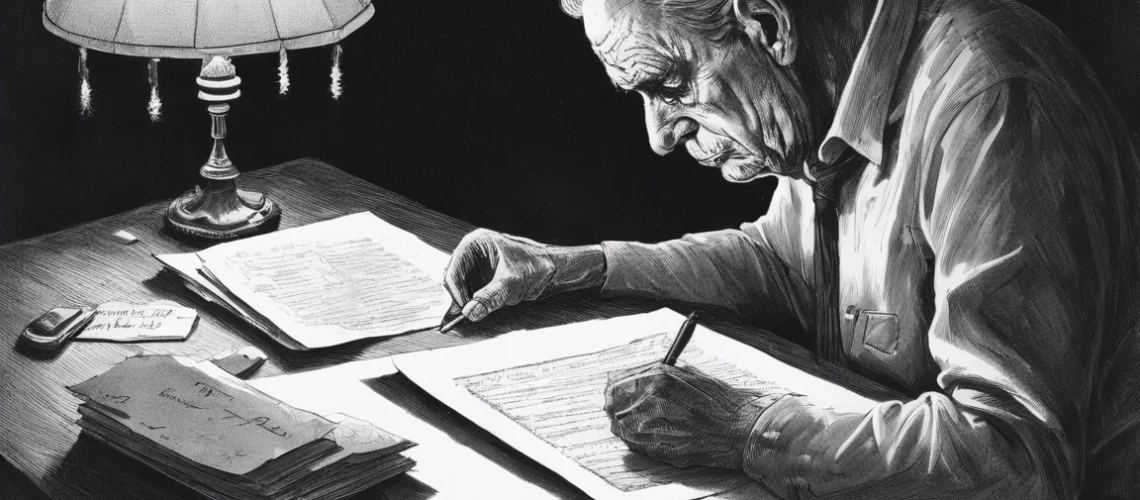Did you know that obituaries are sometimes inaccurate due to the unexpected nature of their composition? When we lose a loved one, we often find ourselves in a whirlwind of emotions, making it challenging to gather all the necessary information to write an obituary accurately. It’s in these unforeseen circumstances that we realize the importance of knowing how to write an obituary.
Writing an obituary is a powerful way to honor the memory of a departed loved one. It allows us to craft a heartfelt tribute that captures their unique spirit and shares their story with the world. But why stop there? Take control of your own legacy by writing your own obituary in advance, ensuring that your final wishes and preferences are represented.
Key Takeaways:
- Obituaries can be inaccurate when written unexpectedly, highlighting the importance of knowing what information you will need, plus how to write one without having to “reinvent the wheel”.
- Writing an obituary is a powerful way to honor a loved one’s memory and share their unique story.
- By writing your own obituary, you can ensure accuracy and convey your final wishes effectively.
- Knowing how to write an obituary allows you to create a lasting tribute that captures the essence of the departed individual.
- Take control of your own legacy right now by using our free obituary template as a starting point for writing your own obituary.

The Art of Writing an Obituary
Writing an obituary is both a meaningful and important task. It allows us to pay tribute to our loved ones, while also providing a lasting record of their life. To help you navigate this process, I’ve developed a simple obituary guide and template that can be customized to suit your needs.
The free obituary template consists of clear sections that guide you in including essential information about the departed individual. Start with a brief introduction that states the full name, age, and date of passing. Follow this with a personal background section, highlighting significant life events, accomplishments, and interests.
Next, include a family and predeceased section, which serves to acknowledge immediate family members and anyone who has passed away before the deceased. This can also include information about surviving relatives.
Another important section to include is the legacy and impact, where you can provide insights into the deceased’s character, values, and contributions to their community. This is an opportunity to capture the essence of the individual and leave a lasting impression on readers.
After that, it’s important to share details of the memorial service, such as the date, time, and location. You may also want to mention if there are any specific requests regarding flowers or charitable donations.
Lastly, end the obituary with closing remarks that express gratitude to friends, family, and the community for their support during this challenging time. You may also provide information on where condolences can be sent.
Remember, an obituary is more than just a list of facts. It’s a chance to celebrate a unique life and honor the person who has passed away. Take your time with the writing process, and don’t be afraid to include personal anecdotes, cherished memories, or meaningful quotes that reflect the individual’s spirit.
By following an obituary template, you can create a compelling narrative that captures the essence of your loved one and serve as a beautiful tribute to their memory. Remember, this template is a guide, and you can customize it to reflect the unique qualities of the individual being honored.
Sample Obituary - Template
 Copy and paste the following template into a document editor of your choice and simply replace the example text with your own personalized information. You will also want to delete sections that do not apply, such as military service or pets.
Copy and paste the following template into a document editor of your choice and simply replace the example text with your own personalized information. You will also want to delete sections that do not apply, such as military service or pets.
<Introduction> In Loving Memory of <Name> (<Year of Birth> – <Current Year>)
We are heartbroken to announce the passing of our beloved <Relationship to deceased (e.g., mother, father, sister, brother, friend)> <Name>, who died (<peacefully, after a long illness, specific reason, etc.>) on <Date of Death> at the age of <Age>.
<Name> was born on <Date of Birth> in <City, State> to <Parents’ Names (optional)> (predeceased?) and brought joy to all who knew them.
<Family Life> A Devoted Family Person
<Name> was a cherished member of a loving family. They are survived by their <List surviving family members (e.g., spouse, children, siblings, etc.)>: <Spouse’s Name> (spouse), <Child’s Name> (son/daughter), <Child’s Name> (son/daughter), <Sibling’s Name> (brother/sister), and many loving nieces, nephews, and cousins. <Name> was predeceased by <List predeceased loved ones (optional)>, whose memory they held dear.
<Life’s Journey> A Fulfilling Life
Option 1 – Career: <Name> lived a rich and fulfilling life. After graduating from <School Name> in <City, State>, they went on to pursue a successful career in <Field of Work>. <Name> was highly respected by their colleagues at <Company Name> for their dedication and expertise in <Specific area of expertise>. <Optional: Mention military service and any notable achievements or recognitions in their career.>
Option 2 – Homemaker: <Name> lived a life rich in love and purpose. After graduating from <School Name> in <City, State>, they dedicated themselves to creating a warm and nurturing home for their family. <Name> was a pillar of strength and support, always there to offer a kind word, a helping hand, and endless encouragement. Their dedication and care ensured a loving and supportive environment for their loved ones.
<Beyond Their Life’s Work> About Their Life
Beyond their professional accomplishments, <Name> was passionate about <Hobbies and Interests>. They found great joy in <Specific hobbies or activities>. <Optional: Include an anecdote or two that reflects their personality and interests.> <Name>’s love for <Pet’s Name> (predeceased pet, optional) brought them much happiness.
<Faith and Service> Personal Attributes
<Name>’s faith in [Religious Affiliation (optional)] was a source of strength and comfort throughout their life. It also fueled their passion for helping others, and they actively participated in the community through [mention specific ways they were involved, e.g., volunteering at a faith-based organization or participating in community service projects]. Their commitment to their faith and their community made a lasting impact.
<A Lasting Memory> What Set Them Apart
<Name> will be remembered for their <Positive qualities (e.g., kindness, generosity, humor, etc.)>. They had a gift for making others feel loved and appreciated. <Optional: Include a touching quote or sentiment that reflects the impact they had on others.>
<Celebrating a Life> Info About Services
A memorial service will be held in honor of <Name> on <Date> at <Time> at <Location>. In lieu of flowers, donations may be made in <Name>’s memory to <Charity Name>, a cause they deeply cared about. <Optional: Include information on how to offer online condolences.>
We are grateful for the outpouring of love and support during this difficult time. <Name> will be deeply missed by all who knew and loved them.
Writing Your Own Obituary: The Way You Want It To Be
Writing your own obituary may seem like a daunting task, but it allows you to leave a lasting legacy and ensure that your story is told in your own words. By taking control of your obituary, you have the opportunity to ensure accuracy and convey your final wishes effectively.
When approaching the task of writing your own obituary, it can be helpful to use the sample obituary template as a starting point. This template provides a framework that includes key information such as your full name, date of birth, and date of passing. It also allows space to include details about your life, accomplishments, and meaningful relationships.
“Writing your own obituary allows you to shape the narrative of your life and highlight the experiences that were most important to you. It’s a chance to share your values, beliefs, and lessons learned with those you leave behind.”
Consider using the sample obituary above as a reference to gather ideas on how to structure your own obituary and what details to include. However, remember that everyone’s obituary should be unique and reflect their individuality and personal journey.
When writing your own obituary, don’t shy away from including meaningful anecdotes or stories that capture the essence of who you are. Share your passions, hobbies, and the impact you had on the lives of others.
Remember to include your final wishes in your obituary, such as any charitable organizations you wish to be supported or specific funeral arrangements. Writing your own obituary ensures that these important details are communicated accurately and honored.
Comparison of Traditional Obituary vs. Writing Your Own Obituary
| Traditional Obituary | Writing Your Own Obituary |
|---|---|
| Family member or close friend may not know your birth place, parents, other family names. | Written by you, all information and family names mentioned will be complete and accurate. |
| May not fully capture your unique story | Allows you to shape the narrative and highlight what’s important to you |
| May oversimplify or omit certain details | Gives you the opportunity to include meaningful anecdotes and specific wishes |
| Relies on secondhand information | Enables you to convey your own voice and perspective |
Writing your own obituary is a powerful act that allows you to leave a meaningful legacy and ensure that your story is told authentically. By taking the time to craft your own obituary, you can provide comfort and closure to your loved ones and leave a lasting testament to your life and values.
Honoring Your Loved One: Memorial Services and Tributes
Losing a loved one is a difficult experience, and finding ways to honor their memory can bring comfort and healing. Memorial services and tributes provide an opportunity to celebrate the life of the departed and remember the impact they had on our lives. In this section, I will explore various ways to honor your loved one through meaningful memorial services and heartfelt tributes.
Types of Memorial Services
Memorial services come in different forms, allowing family and friends to gather and pay their respects in a way that reflects the wishes and values of the deceased. Some common types of memorial services include:
- Traditional Funeral Service: Held at a funeral home or place of worship, this service often includes religious rituals, eulogies, and the opportunity for attendees to offer condolences.
- Celebration of Life: A more personalized and uplifting approach, a celebration of life focuses on the joy and positive aspects of the departed’s life. It may involve shared stories, music, and activities that capture their personality and passions.
- Memorial Gathering: This type of service can be held at various locations, such as a park, beach, or the departed’s favorite spot. It provides a more relaxed and informal setting for remembrance and reflection.
Creating Meaningful Tributes
Tributes give us a way to honor our loved ones and keep their memory alive. Here are some meaningful tribute ideas to consider:
- Obituary: Writing a thoughtful and heartfelt obituary can provide a lasting tribute to your loved one. Include important details about their life, accomplishments, and the impact they had on others.
- Memorial Websites: Create a dedicated website or online memorial to share memories, stories, and photos. This allows friends and family to contribute their own tributes and keepsakes.
- Charitable Donations: In lieu of flowers, ask for donations to a charity or cause that was important to your loved one. This helps carry on their legacy and supports a cause they cared about.
- Memorial Artifacts: Create or choose meaningful artifacts, such as personalized jewelry, engraved plaques, or memorial keepsakes, that can be passed down through generations as a cherished reminder of your loved one.
Offering Condolences and Utilizing Obituary Search Tools
During this challenging time, offering condolences to the bereaved family is a kind and compassionate gesture. Express your sympathy through cards, messages, or attending the memorial service. Additionally, obituary search tools and archives can be valuable resources for finding and sharing obituaries, allowing people to offer their condolences and support.
| Benefits of Using Obituary Search Tools and Archives | How to Utilize Obituary Search Tools and Archives |
|---|---|
| 1. Access to Past Obituaries | 1. Use online obituary search platforms to browse and find obituaries from the past. |
| 2. Genealogical Research | 2. Utilize obituary archives to gather information for genealogical research and family history projects. |
| 3. Paying Respects | 3. Share obituaries on social media or directly with individuals to pay respects and offer condolences. |
| 4. Gathering Information | 4. Find information about memorial services, funeral arrangements, and other important details through obituary search tools. |
By embracing the opportunity to honor our loved ones through memorial services, heartfelt tributes, and the use of obituary search tools, we can create a meaningful legacy and find solace in our shared memories.
Writing a heartfelt obituary is truly a meaningful way to honor the memory of a loved one. It allows us to capture their unique story and share it with others, ensuring that their legacy lives on.
Furthermore, considering our own obituary is an important step in ensuring that our final wishes are accurately conveyed. By taking control of this narrative, we can include specific details and preferences that truly reflect who we are and how we want to be remembered.
Obituary Search Tools
- Legacy.com (Search for Obituaries: https://www.legacy.com/obituaries/search)
- Ancestry.com (U.S. Obituary Collection, 1930-Current) (U.S., Obituary Collection, 1930-Current – Ancestry: https://www.ancestry.com/search/collections/7545/)
- FamilySearch (United States Obituaries) (United States Obituaries – FamilySearch: https://www.familysearch.org/en/wiki/United_States_Obituaries)
- Tributes.com (https://www.tributes.com/)
- Funeral homes websites (Funeral homes often publish obituaries for families they serve on their websites)
- Genealogy websites (These websites may have databases of obituaries from various sources)
- Newspaper archives (Many newspapers offer online archives where you can search for obituaries)
FAQs
Q. Why is it important to know how to write an obituary in a certain format?
A. Writing an obituary is a way to honor and remember a loved one’s life. It allows us to share their story, accomplishments, and how they made a difference in the lives of others. It also serves as a public announcement of their passing and provides information about memorial services.
Q. What should be included in an obituary?
A. A well-written obituary typically includes a comprehensive overview of the deceased’s life and legacy. Here are the key elements to consider:
- Biographical Information: This includes the full name of the deceased, their age at the time of passing, date and place of birth, and date and place of death.
- Family:
- Survived By: List close family members who are still living, such as spouses, children, siblings, parents, or grandchildren.
- Predeceased By (optional): You can mention loved ones who died before the deceased, such as parents or spouses.
- Life Story: This section details the deceased’s accomplishments, career path, military service (if applicable), religious affiliation (if important), and any notable contributions they made to their community or field.
- Personal Tributes: Include details about hobbies, interests, and cherished pets. If humor reflects the deceased’s personality, a light-hearted anecdote can be appropriate.
- Memorial and Service Information:
- Memorial Service (optional): Briefly mention the date, time, and location of any public memorial services.
- Funeral Arrangements (optional): If the funeral is open to the public, you can include a brief mention of the time and location.
- Pallbearers/Honorary Pallbearers (optional): List the individuals who will be carrying the casket or serving in an honorary capacity.
- Giving Back:
- Cause of Death (optional): While some may choose not to include it, the cause of death can be mentioned, especially if the deceased passed away after a long illness or in an accident.
- Charitable Donations (optional): If the family requests donations to a specific charity in lieu of flowers, mention the charity’s name and any relevant website or donation information.
- Expressions of Sympathy: This section can mention how to offer condolences, whether it’s through cards, messages, attending the memorial service, or leaving online condolences (if a website is available).
By incorporating these elements, you can create a comprehensive and informative obituary that truly honors the memory of the deceased.
Q. How can I write my own obituary?
A. Writing your own obituary can be a meaningful way to ensure your story is accurately portrayed and your final wishes are known. You can use the obituary template as a starting point and personalize it with your own unique experiences, accomplishments, and reflections. It’s also helpful to involve a trusted friend or family member to provide additional insights and proofread the final draft.
Q. How can I honor my loved one through memorial services and tributes?
A. There are various ways to honor a loved one through memorial services and tributes. You can organize a traditional funeral or memorial service, create a personalized slideshow or photo display, write and share eulogies or tributes, or create a memorial website or social media page. Additionally, offering condolences and sharing memories or stories about the departed can provide comfort to the family and contribute to the overall tribute.















